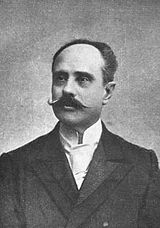Ernesto Hintze Ribeiro: Difference between revisions
No edit summary |
Category |
||
| Line 81: | Line 81: | ||
[[Category:1907 deaths]] |
[[Category:1907 deaths]] |
||
[[Category:People from São Miguel Island]] |
[[Category:People from São Miguel Island]] |
||
[[Category:Regenerator Party politicians]] |
|||
[[Category:Prime Ministers of Portugal]] |
[[Category:Prime Ministers of Portugal]] |
||
Revision as of 12:24, 3 March 2016
Ernesto Hintze Ribeiro | |
|---|---|
 | |
| 43rd President of the Council of Ministers | |
| In office February 22, 1893 – February 5, 1897 | |
| Monarch | Louis I |
| Preceded by | José Dias Ferreira |
| Succeeded by | José Luciano de Castro |
| 45th President of the Council of Ministers | |
| In office July 26, 1900 – October 20, 1904 | |
| Monarch | Carlos I |
| Preceded by | José Luciano de Castro |
| Succeeded by | José Luciano de Castro |
| 47th President of the Council of Ministers | |
| In office March 19, 1906 – May 19, 1906 | |
| Monarch | Carlos I |
| Preceded by | José Luciano de Castro |
| Succeeded by | João Franco |
| Personal details | |
| Born | November 7, 1849 Ponta Delgada, Azores Islands, Portugal |
| Died | August 1, 1907 (aged 57) Lisbon, Portugal |
| Political party | Regenerator Party |
| Spouse | Joana Rebelo de Chaves |
| Alma mater | University of Coimbra |
| Occupation | Lawyer |
Ernesto Rodolfo Hintze Ribeiro, (Portuguese pronunciation: [eɾˈnɛʃtu ʁuˈdoɫfu ˈĩtzɨ ʁiˈbɐjɾu]; Ponta Delgada, Azores Islands, November 7, 1849 – Lisbon, August 1, 1907) was a prominent Portuguese politician. His name sometimes appears styled as Ernesto Rudolfo, Ernesto Rodolpho Hintze Ribeiro and Ernst Rudolph Hintze Ribeiro.
He was a prominent parliamentarian and Peer of the Realm, Attorney-General of the Crown, Minister of Public Works, of Finance and Foreign Affairs as well as uncontested leader of the Regenerator Party, holding the position of President of the Council of Ministers (Prime Minister) thrice (February 22, 1893 – February 5, 1897; July 26, 1900 – October 20, 1904; March 19, 1906 – May 19, 1906). He was one of the dominant politicians of the final part of the Portuguese Constitutional Monarchy, occupying the post of Prime Minister longer than any other in his time. He was responsible for important reforms, some of them are still valid, such as the insular autonomy for the Azores and Madeira islands (1895), the pharmacies' law, and forest's law (1901).
He was made effective Councillor of State in 1891, received many decorations, among them the Great-Cross of the Order of the Tower and Sword. He was associate of the Royal Academy of Sciences.
References
